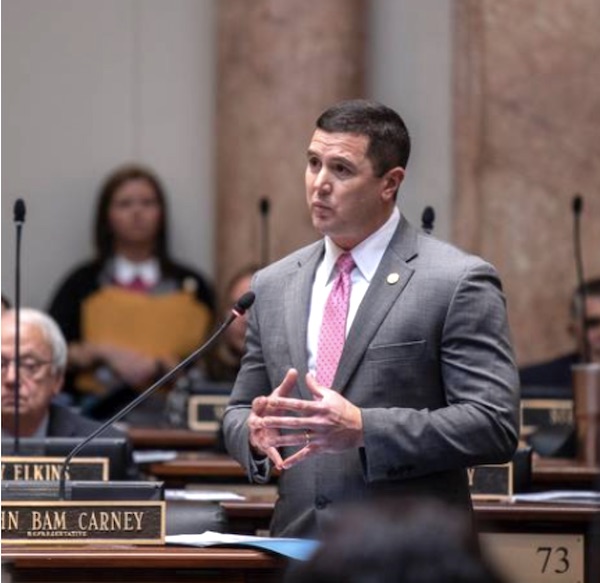
KY Republicans unveil bill to help people move from public assistance to paying jobs
FRANKFORT – House Republicans filed a public assistance reform bill Monday aimed at encouraging people who receive public assistance to join the workforce. Among other things, the bill would allow the state to temporarily pay private health insurance premiums for Kentuckians who make up to 200 percent of the federal poverty level and could eventually apply work requirements to expanded Medicaid recipients.
House Bill 1, filed by House Speaker Pro Tempore David Meade, R-Stanford, is considered a priority for House Republicans. House Speaker David Osborne, R-Prospect, said it would move quickly through the House in the next two weeks.
“I think the goal goes way beyond savings to the Medicaid programs, to the public assistance programs,” Osborne said. “The real savings is getting people back in the work force and making them productive tax payers again and get involved with the public assistance rolls as quickly as possible.”
An analysis of how much the bill might cost has not yet been prepared.
House Minority Leader Joni Jenkins, D-Louisville, declined to comment.
At the core of the bill is a provision that would allow the state to use money from the Temporary Assistance for Needy Families program to pay private health insurance costs for people who make below 200 percent of the federal poverty line, which for a family of four, was $51,500 a year in 2019.
The program, which is called “bridge insurance” because it attempts to bridge the transition from Medicaid to private insurance, would be indefinite for people who make below 138 percent of the federal poverty level ($35,535 for a family of four). For people who are between 1138 percent of the federal poverty level and 200 percent, the state would only pick up the cost of health insurance for one year.
Meade said he is not aware of any other state who has a similar program, but said it was the top concern that came up in the Public Assistance Reform work group last year.
“No one should have to make that choice of whether they’re going to provide insurance and security for their families or go out and make more money,” Meade said.
The bill also carves out a scenario in which people receiving Medicaid under expanded eligibility requirements allowed by the federal Affordable Care Act would have work requirements — a goal of former Gov. Matt Bevin that was rejected twice by a federal court and rescinded by Gov. Andy Beshear. If 75 percent of the money the state spends on Medicaid were to go to the expanded Medicaid population, people in the expanded Medicaid program for more than a year would have to participate in at least 80 hours of work requirements a month.
Currently, only 10.7 percent of the money the state spends on Medicaid goes to the expanded Medicaid population, according to a report by the Department of Medicaid Services.
Meade said the bill would also limit the people who are exempt from work requirements on SNAP to just the primary caregiver of a child.
To combat fraud, the bill allows the state to participate in a federal program called the National Accuracy Clearinghouse, which pools data between states to prevent “double dipping,” or people getting public assistance in more than one state.
The bill also would move all public assistance benefits onto one card and codifies federal restrictions against using public assistance money to buy alcohol and tobacco or to spend the money at casinos and strip-clubs. People would not be able to use more than 25 percent of their SNAP benefits on energy drinks or soft drinks. People with the public assistance card would not be allowed to use it to take money out at an ATM and would risk losing all of their public assistance benefits if they were caught selling their card.
Instead of requiring drug testing before receive public assistance, as House Republicans proposed last year, the bill requires people who have been convicted of a felony drug offense to get treatment for their addiction within 90 days of being released from prison in order to maintain their public assistance benefits.
Much of the bill, Meade said, is an attempt to “deter fraud.” Experts who testified in front of the Public Assistance Reform task force said the rate of fraud is only about two percent, but Meade is skeptical.
“Folks don’t commit fraud anticipating on getting caught,” Meade said. “So to say that we only have a two percent fraud rate, in my opinion, that’s probably pretty ridiculous.”
By Daniel Desrochers
Lexington Herald-Leader













![Foothills-Bundle] Foothills-Bundle](https://thelevisalazer.com/wp-content/uploads/2020/05/Foothills-Bundle-422x74.jpg)




